|
You’ve been told you need a root canal to save your tooth and remove an infection, and you’re wondering if you’re in for a painful experience. Back in the day, root canals were notorious for being unpleasant. It’s only natural for you to feel nervous about your upcoming treatment. However, our root canal treatment in Houston, TX, is painless and easy. What is a root canal? A root canal (endodontic treatment) is a dental procedure used to remove an infection from the pulp, save the tooth, and prevent reinfection. This procedure will help save your natural tooth, relieve pain, and make your teeth healthy again. When do you need a root canal? You’ll need a root canal for a chipped or cracked tooth, deep decay from an untreated cavity, or issues from your previous filling. Below are the symptoms you may experience if you need root canal therapy:
How long do root canals take? Typically, a root canal treatment takes around 30 to 60 minutes to complete, and more complex cases can take up to 90 minutes or more. The procedure typically requires an appointment or two to complete. How are root canals performed? To conduct a root canal, your dentist or endodontist will x-ray your teeth to determine if performing the procedure is viable and if the infection has spread to other regions. Then, your dentist will numb the gum near your affected tooth with a small amount of numbing medication and then inject a local anesthetic into your gums. Once your tooth is numb, your dentist will access the affected pulp by making a small opening in the top of your tooth. This pulp will contain blood vessels, sensitized nerves, and bacteria, which your dentist will remove before carefully cleaning all the canals in your tooth. Your dentist will then coat the area with antibiotics to disinfect it and prevent reinfection. Once the canals are disinfected and cleaned, your dentist will end the procedure by filling and sealing your tooth. They may also prescribe oral antibiotics and over-the-counter pain medications to avoid post root canal pain. Does it hurt?
You won’t feel any pain during the root canal procedure, thanks to the local anesthesia that dentists use. The pain associated with root canal treatments comes from the tooth itself before you get it treated. The truth is, removing the infection removes the pain. Painful root canals are actually a myth. Even if anesthesia is not used, you shouldn’t feel any pain during your root canal treatment. To be on the safe side, the dental professionals at Locust Family Dentistry use anesthesia to numb the tooth and avoid the slightest possibility of pain. You may feel a little pressure on your tooth during the procedure but nothing more than that. You’ll likely experience mild pain and discomfort for a few days after the procedure. This pain is normal to experience for a bit, and you can manage it with pain medications. Keep in mind that if it lasts beyond a week, you should visit your dentist. Root canal treatment in Houston, TX Root canals aren’t that scary anymore, so you don’t have to be afraid of being honest with your dentist. If you’ve been told you need a root canal, or you’re experiencing its symptoms, Locust Family Dentistry offers pain-free root canal treatment in Houston, TX. We also offer restorative dental services to keep your smile bright and your mouth healthy. Book an appointment today!
1 Comment
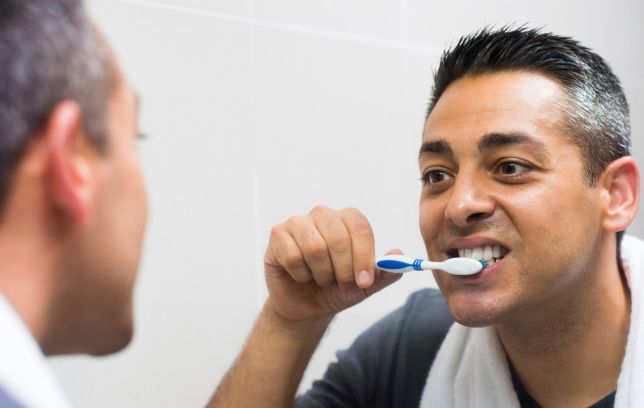 Welcome to a new year of resolutions, goals, and establishing new habits and routines. We are far enough into January to know which habits may stick and which may change based on commitment or convenience. Hopefully, this is the year that you choose to embrace and improve your oral hygiene. Oral health habits are not a trend to turn on or off with every new fad that comes your way. Taking care of your dental health is a lifelong commitment. Whether you are renewing your promise to follow good oral hygiene or you are brushing up on tips and advice after a lapse in care, the benefits cannot be denied. Here, we discuss the importance of oral health and explain the benefits of improving your oral health this year. Why is oral health important? Keeping your teeth and gums healthy is about more than just a beautiful smile. Your teeth have important roles in chewing, helping with digestion, and speaking. They provide structure to the cheeks and face helping you look younger. Additionally, your oral and overall health are connected; improving the health of your mouth benefits the body too. Benefits of improved oral health Let’s face it, there are no downsides to choosing to take care of your teeth and gums. The following are just a few of the top benefits to improving your dental health. Prevents tooth decay and gum disease Following good oral hygiene helps to prevent cavities and periodontal disease. Regular brushing with fluoride toothpaste and flossing helps to keep plaque, tartar, and bacteria off your teeth and away from the gums. This keeps plaque from eating away at the tooth enamel and causing cavities. It also prevents bacteria from entering and spreading through the gums and causing gum disease. Stops bad breath Poor oral health is a common cause of bad breath. The collection of bacteria and food particles can add to the problem. Regular brushing and flossing remove these items. Scraping the tongue and using mouthwash may help too. Additionally, dry mouth is a common cause of bad breath. A lack of saliva can cause decay and bad breath. Be sure to stay hydrated, chew sugar free gum, and avoid tobacco products. Prevents more serious diseases Without good oral habits and routine dental care, problems may go unchecked. General dental appointments are important for assessing oral health and looking for signs of decay, damaged teeth, and disease. If plaque and bacteria are allowed to spread without proper care or treatment, more serious dental procedures will be needed to address the issues. For example, a small area of decay now can be easily filled and treated. If it is left to fester, it may grow to need a root canal or an extraction. Poor oral health has also been linked to health problems such as heart disease, pregnancy or birth issues, and pneumonia. Improving your oral health means improving your overall health. Brightens your smile Regular brushing and flossing are simple ways to remove daily surface stains and food particles from the teeth. This is an easy way to keep your smile bright. Along with that, regular cleanings with your hygienist do more than just check for tooth decay and gum disease. Your hygienist uses special tools to scrape off tartar. This helps to remove some of the yellowish staining that appears on the teeth. If you are plagued by more severe staining, your dental team may recommend a safe, professional teeth whitening procedure for more dramatic brightening. Following healthy eating habits, avoiding overly acidic or sugary foods, and reducing teeth staining products also help to keep your smile bright. This will extend the benefits of your dental treatments and give your confidence a boost as you show off your smile. Enhance your oral hygiene with help from Texas Dental Group Prioritize oral hygiene and dental health in 2022. Locust Family Dentistry provides comprehensive dental procedures Houston, TX, to keep your smile healthy and beautiful. From routine care to more advanced cosmetic and restorative treatments, we have your oral health covered. Book your appointment today! 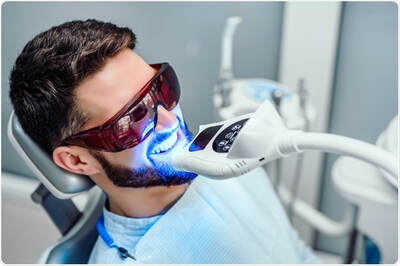 Professional at-home teeth whitening kits are those obtained from your dentist which contain a high concentration of either hydrogen peroxide or carbamide peroxide. They are slightly more expensive than over-the-counter whitening kits; but they are also more effective. Custom-fitted dental trays are included to keep the whitening solution on the surface of the tooth and limit the exposure of the solution to the sensitive gum (gingival) area. Professional in-home kits are relatively easy to use and offer exceptional results after just one to two weeks of use. Using Home Whitening Kits Professional in-home whitening kits aren't something you can pull off the shelf. Custom-made trays (dental cups fitted to the contour of your teeth) must be manufactured in order to ensure the whitening solution are properly distributed. Without these, a lot of the solution could be wasted or put onto areas of the mouth that may be damaged. There are several steps to obtaining and using in-home teeth whitening kit:
Professional In-Office Teeth Whitening
If do-it-yourself whitening is not your cup of tea, you can always opt for professional in-office whitening. It is a slightly more expensive procedure but one that offers more reliable results. Besides cost, the one downside is that you may need to make multiple visits to the dentist's office. With that being said, professional whitening delivers optimum results over a relatively short amount of time. The process is pretty straightforward:
There are several options for teeth whitening that a Texas Dental Group dentist can use or recommend to patients. Your dentist could conduct a scale and polish and then whiten your teeth in-house. This can significantly change the coloring of your teeth should you have stained/dark/yellow teeth. Our whitening systems also use laser procedures to whiten teeth. Visit a Texas Dental Group location today or call us at 281-588-0083 to schedule a visit. 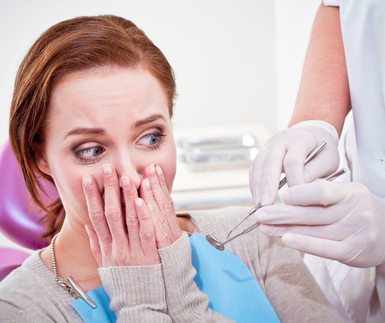 As many as 40 million Americans avoid the dentist because of fear and anxiety, according to Columbia University College of Dental Medicine. So, why the fear of the dentist? People are anxious about dental visits for different reasons. Some anticipate pain. Others worry that the dentist might be rushed or neglect their concerns. Additional stressors include negative memories of past experiences and even the sterile smell of the dental office. Sometimes, simply interrupting the normal day's routine for a dentist visit creates anxiety. If unaddressed, dental anxiety can lead to oral health problems, which can, in turn, require more dental treatment. 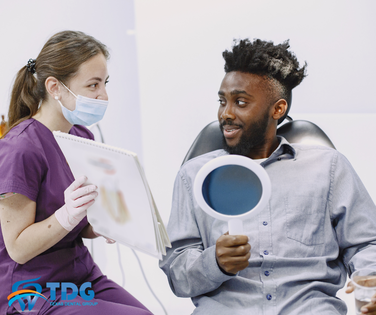 Trust and communication help lower stress One of the most important factors in overcoming dental anxiety is good communication between you and your dentist. When you feel informed and in control throughout a visit, you’re typically less anxious. ”It’s common for people to feel some level of anxiety when visiting a physician or dentist,“ said Kevin Sheu, DDS, professional services director for Delta Dental. “However, if a patient’s anxiety is preventing access to needed care, the individual should have a frank discussion with the dentist before starting any treatment. As health care professionals, dentists are trained to treat patients who have anxiety. Many safe and comfortable techniques can make dental care less stressful, including the use of medication.”  Tips for staying calm when you visit the dentist If you’re nervous about an upcoming dental visit, try these ways to curb your anxiety:
Lower on the fear spectrum (but still very real for some) are the anxieties already discussed. Communicate your feelings to your doctor. And try this trick: feel gratitude for your teeth and for your access to good care. Research shows that people who practice gratitude are more optimistic, healthier, get better sleep, and, in turn, experience less anxiety. To schedule an appointment with us, please call the location nearest you: Conroe - (936) 760-3050, Galveston - (409) 740-7744, Homestead - (713) 633-1922, and Richmond - (281) 238-4454. You can also schedule an appointment at www.texasdental.group.
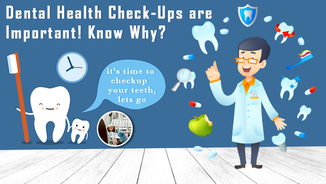 Have you ever wondered why your dentist recommends to re-visit the clinic every six months? Well, its time you know the reason behind it. Routine dental check-ups are crucial for long term maintenance of oral health for people of all ages. Usually, dentists recommend that the first visit of a child should be as soon as one year of age. This helps to build the foundation for the excellent health of teeth and gums. Moreover, it also impacts the overall well-being of the individual. Routine dental check-ups have several benefits such as; early detection and prevention of dental diseases like tooth decay, gum disease, and even periodontal problems. If you are considering skipping your next routine dental appointment, you might want to read further to weigh your options. We will discuss the importance of routine dental check-ups. Furthermore, we will highlight the benefits of a regular dental check-up. What happens during a dental check-up? Generally, a routine dental check-up is performed in two phases: Examination During the examination, the dentist identifies tooth decay or abnormalities that may negatively affect the health of the teeth and gums. X-rays are also a part of the dental examination that determines the extent and location of the damage to the tooth, gums, and alveolar bone. Additionally, the dentist also evaluates the degree of plaque and calculus on the tooth surface. Dental plaque is typically a sticky layer of bacteria and debris that forms on the surface of the teeth. Improper oral hygiene practice can lead to the hardening of the plaque called calculus. Excessive accumulation of plaque and calculus usually initiates oral diseases. After tooth examination, the gums’ health is evaluated using a periodontal probe to check the depth of the spaces between the teeth and gums. In a healthy mouth, the gums are firmly attached to the tooth surface. However, people with gum diseases may have deep pocket formations. Lastly, the dentist evaluates the health of your throat, tongue, and other soft tissues in the mouth. Moreover, they may also consider extra-oral signs such as redness or swelling associated with the face, head and neck. Oral prophylaxis Once a thorough dental examination is performed, the hygienist may proceed to clean your teeth. During this procedure, the hygienist uses an ultrasonic scaler to loosen and remove the mineralized calculus from the tooth surface. Moreover, dental professionals also clean the interdental spaces and areas which are hard to clean with a toothbrush. After scaling, the tooth surface is polished using a gritty paste to remove the surface stains present on the tooth. Finally, every interdental space is flossed to ensure complete cleaning of the teeth. Ideally, it is best to visit a dentist every six months to maintain proper health and hygiene. The importance of routine dental check-ups
A routine dental check-up is essential for the following reasons:
Such steps can lead to prompt treatment and prevention of extensive tooth damaging conditions. Moreover, professional teeth cleaning reduces the amount of disease-producing bacteria in the mouth. They are thereby enhancing the oral health of the patient.
Moreover, it is a great way to familiarize yourself with the dental office environment to reduce nervousness and anxiety.
Therefore, it is essential to take every preventive measure to maintain the health of your teeth and gums. This will help you to stay healthy and fit in your life.
What are the benefits of a routine dental check-up?
Routine dental check-ups include professional teeth cleaning. This effectively cleans the teeth and gums by removing the food debris, plaque, and calculus in the mouth—thereby reducing the incidence of bad breath.
Routine dental cleaning eliminates the calculus buildup and saves the gums from the adverse effects of calculus and disease-producing bacteria in the mouth.
The dentist may show you the effects of such habits on your oral health and provide you with solutions that you can use to overcome them effectively. What is your responsibility after a dental check-up? It is essential to take proper care of your teeth and gums by following regular oral hygiene practices. Following these steps are the best way to achieve good oral health:
Take away message Regular dental visits are crucial to maintaining the health of your teeth and gums. Usually, a routine dental check-up involves detailed examination and professional tooth cleaning. Such measures help to detect dental diseases at early stages and prevent them from further damaging the tooth and gums. Additionally, routine dental check-ups help to maintain long term relations with your dentist, save money, prevent the spread of severe dental diseases, and enhance your looks and confidence. Now that you've understood the importance of routine dental check-ups, don't forget to visit your dentist at least twice a year. Moreover, follow a good oral hygiene routine to stay healthy and happy. You can easily schedule an appointment with us at Texas Dental Group. Please call a location nearest you: Conroe - (936) 760-3050, Galveston - (409) 740-7744, Houston - (713) 633-1922, and Richmond - (281) 238-4454. You can also schedule an appointment at www.texasdental.group.  Dental Implants are human-made replacements for the root of a tooth. If a patient has broken or missing teeth due to injury, periodontal disease, decay, or congenital defects, a dental implant can replace a single tooth, several teeth, or the entire upper or lower jawline. The dental implant procedure is the placement of permanent, prosthetic teeth that look and function like the real thing. The implant procedure is designed to be painless and provide a smile that lasts a lifetime. When placed by an experienced team of dental implant professionals at Texas Dental Group, the procedure is one of the safest and most successful in dental and cosmetic practices. 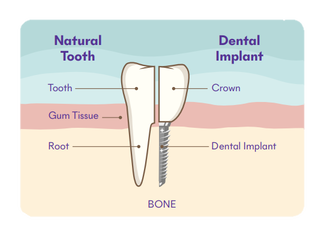 WHY DO PEOPLE NEED DENTAL IMPLANTS?
2. To reinforce the structure of the jawbone: When a tooth is lost, the integrity of the jawbone underneath it is compromised. The neighboring teeth then begin to slowly drift. This also causes gradual degrading of the jawbone which in turn causes facial deformity. When a lost tooth is replaced with an implant, the integrity of the jaw is maintained. WHAT ARE THE DIFFERENT TYPES OF DENTAL IMPLANT CASES? 1. CONVENTIONAL: In standard cases, dental implants are embedded within the jawbone. Conventional dental implants can be a single tooth, bridge, or a full arch.
2. ZYGOMATIC: In cases of severe bone loss, Zygomatic dental implants will be embedded into the cheekbone (Zygoma). Zygomatic implants are only different from conventional implants in the method of embedding and the length of the implant. This method is used to replace the teeth in the upper jaw. To provide our patients with the most innovative dental implant technology, our practice offers the DIOnavi EcoDigital Implant Procedure. Our Texas Dental offices specialize in a variety of cosmetic and aesthetic dental procedures. These procedures include crowns, Lumineers, laminates, dental implants, and more. Below, you can learn more about each of these procedures. If you’re interested in any form of cosmetic dentistry, feel free to contact us for a detailed consultation. HOW THEY WORK
 The DIOnavi Difference DIOnavi EcoDigital Implant Procedure What makes us different than other dental offices that place implants is the type of implant we use. We have partnered with dental technology company called DIOnavi to provide our patients with an implant that provides the most comfort and the fastest turn around. With our collaboration with DIOnavi our patients are able to start their treatment when they receive their consultation. The entire implant process includes an initial consultation where our team will answer any and all questions you or a loved one have about the implants. At that same appointment, we can take a scan to begin creating the digital impression for implants or we can schedule a separate visit for the scan. The subsequent appointment will be the appointment to place the implant. Expect to have a post operation visit a week or two after the implant is placed. During the post operation visit, we will scan the healing abutment for the crown. The crown will take 3-8 weeks to fabricate. Then the crown will be placed. Our partnership with DIOnavi enables us to give our patients a premier dental experience. With the DIOnavi procedure, data is collected from the patient’s intra-oral scans. That data is then used to create a:
With the personalized, minimally invasive DIOnavi EcoDigital Implant Procedure, there is no surgical incision, and recovery is quick without the complications that come with an incision-based procedure. Conventional implant techniques require a surgical incision and recovery time can be slow and painful due to swelling and risk of infection. Dental Implants are the permanent, ideal solution for tooth loss and decay. Those who favor dentures often do so for the lower cost, yet pay the price of discomfort and occasional slippage, leading to embarrassment or slurred speech. Quality dental implants that are placed by an experienced surgeon and are properly maintained have a 98% success rate to never become loose. Additionally, Implants reinforce the jaw structure as natural teeth do. Dentures add no reinforcement to the jawbone and allow for continued deterioration. This leads to warping of the lower region of the face. Before and after photos of dental implant patients, however, often show an improvement in jaw structure. The DIOnavi EcoDigital Implant Procedure is the clear choice for fast, comfortable tooth replacements. If you have missing teeth, permanent dental implants can be an excellent option to fill those spaces. Implants are more comfortable than dentures, partials, or bridges and can last a lifetime. To schedule an appointment with us, please call the location nearest you: Conroe - (936) 760-3050, Galveston - (409) 740-7744, Homestead - (713) 633-1922, and Richmond - (281) 238-4454. You can also schedule an appointment at www.texasdental.group.  You Can Get it Whiter AND Keep it Healthy A straight and white smile is becoming more sought after than ever before. This mindset began with the ‘Hollywood smile’, when we first started to develop an interest in mimicking the results of celebrity cosmetics. For many at the time, the riches of these stars along with the price of cosmetic dentistry, put such procedures out of reach. But much has changed. Today, the price of cosmetic dentistry, like teeth whitening and adult orthodontics have become far more affordable and accessible. Cosmetic dentistry is now viewed as obtainable and as ‘standard’ as visiting the hairdresser or barber. More of us are taking an interest in our own smile and searching for ways to improve it. This is an extremely positive attitude. However, while changing the appearance of our teeth sits high on many people’s wish list, it is important to remember the most important thing – the health of our smile. How to keep a healthy mouth So how do we achieve a healthy smile? The good news is that the answer is pretty simple. Healthy teeth and gums can be achieved by a good oral health routine at home and regularly visiting our dentist. A good oral health routine only involves a few easy steps:
So there we have it. By sticking to this basic routine, we can achieve that healthy mouth. The next time we show off the results of our latest tooth whitening treatment, we can also be confident that our teeth and gums are in tip-top condition too. To schedule an appointment with us, please call the location nearest you: Conroe - (936) 760-3050, Galveston - (409) 740-7744, Houston - (713) 633-1922, and Richmond - (281) 238-4454. You can also schedule an appointment at www.texasdental.group.  A lot of friends have asked whether it is required to purchase an air purification system for their dental practice post COVID-19. Currently, there are no mandates in place that require offices to purchase air purifiers, however, we at Texas Dental Group put the safety of our patients and staff first always. In dentistry, we have rigorous protocols that fight against germs and viruses. Disinfecting the office with antibacterial agents & proper disposal of medical waste has been a standard long before "social distancing" & "quarantining" became common language in American culture. To continue that tradition, we have implemented an air filtration system to reduce contaminants significantly! We’ve incorporated the Air Scrubber Plus A/C filtration system into all four (4) offices of the Texas Dental Group. What is Air Scrubber you ask? An air scrubber can be installed as part of the office’s central heating and cooling system. It uses UV light waves coupled with a catalytic process to attack germs and other particles while still in the air or on surfaces like countertops. Basically, when our system gets turned on, the air will flow through a titanium dioxide-coated plate. Once inside the plate, the particles pass through a strong UV light. This light works to break-up the makeup of particles and contaminants. Once they are disrupted, they become useless to infect the air. Moreover, these next-generation purifiers (known as air scrubbers) have been shown to remove more than 99% of airborne and surface contaminants, killing pathogens on contact and destroying microorganisms in the air and on surfaces. Air quality in the dental practice is an important subject that deserves careful consideration for its role in creating and maintaining a safe environment for returning patients and staff. We continue to do our best in keeping our offices safe. We believe air filtration is another supplemental tool that will help keep us moving in the right direction. 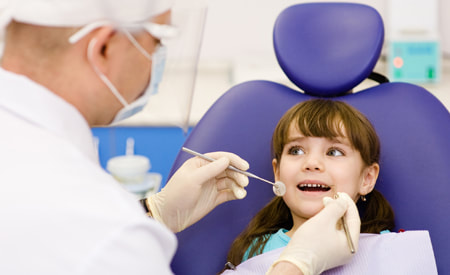 School will be back in session before you know it. Whether your child will be in the classroom or learning from home, a healthy smile is still a back-to-school essential. Some schools require a back-to-school dental exam. Still, it’s always a good time of year to schedule one of your child’s regular visits. “We can help spot and take care of any issues so your child doesn’t have to miss class once school starts,” says Dr. Kenneth Osamor of the Texas Dental Group franchise. “It’s also a great time to help get back on track if some of your child’s dental habits fell away during summer, when normal routines can go out the window and there are a lot more treats around.” And just as this school year might be looking a bit different for your child, their back-to-school appointment will have some changes too. Here are a few questions to ask at your child’s appointment: How Is My Child’s Overall Dental Health? The dentist will be looking at the big picture of your child’s mouth, including teeth and gums. “We will check to make sure teeth are lining up correctly, your child’s bite is in good shape and to keep an eye out for any [orthodontic] issues that may show up later,” says Dr. Kenneth Osamor of the texasdental.group. “We’re also making sure baby teeth are going to the Tooth Fairy like they should.” Will My Child Get a Cleaning Today? This is a must, no matter how well your child brushes. “Even if your child—or you, for that matter—brushes twice a day, it’s not possible to get rid of all the bacteria that can lead to cavities,” Dr. Kenneth Osamor says. “And on the other hand, you may have a child who goes off to camp and never opens their toothbrush.” That’s why a professional cleaning goes a long way. “It removes more of the cavity-causing bacteria and helps to keep gum tissue healthy,” he says. “It can also remove most or many stains from teeth.” Does My Child Need an X-Ray? X-rays help your dentist see how your child’s teeth are developing and make sure the tooth roots are healthy. They also are used to see if there is any tooth decay between your child’s teeth. “The decay process can move very, very fast, so the earlier we can catch it, the better,” Dr. Osamor says. Your child won’t need an x-ray at every visit. “We do them only when necessary,” he says. Can You Check My Child’s Mouthguard? If your child plays sports year-round, make sure you bring his or her mouthguard along so your dentist can check for wear, tear and fit. “If your child is having a growth spurt, losing teeth and getting new ones, the mouthguard might need to be redone,” he says. What Are Sealants? Sealants can be another way to keep your child from getting cavities, but they’re no substitute for brushing and flossing. A sealant is a thin, protective coating (made from plastic or other dental materials) that your dentist can place on the chewing surfaces of your child’s permanent back teeth (called molars). Once they’re on, sealants work to keep cavity-causing bacteria and bits of food from settling into the nooks and crannies your child’s toothbrush can’t reach. This helps keep cavities from forming and tiny existing spots of decay from getting worse. In fact, having sealants on your permanent molars reduces the risk of cavities by 80%. It’s best to get sealants as soon as your child’s permanent molars come through their gums (usually at age 6, then again at age 12). “It doesn’t hurt to put on or apply a sealant,” Dr. Osamor says. “When permanent molars start coming in, parents should ask if sealants are recommended.” Most last for years, and your child’s dentist will make sure they’re holding strong at every regular visit. To schedule an appointment with us, please call the location nearest you: Conroe - (936) 760-3050, Galveston - (409) 740-7744, Homestead - (713) 633-1922, and Richmond - (281) 238-4454. You can also schedule an appointment at www.texasdental.group. When it comes to getting dental treatment, many people push it off. There are many reasons why patients may push treatment off. Including insufficient funds, insecurity about the medical necessity and even going on a vacation. Although these may seem like legitimate reasons getting treatment when the issue is diagnosed is important as to not incur further decay.
Diagnosis of Decay Dentist can detect tooth decay by:
Decay is an Active Process The biggest reason we recommend patients get treatment as soon as decay is diagnosed is because decay is an active process. When someone is diagnosed with any varying degree of decay, overtime the decay will worsen. Although preventative measures like bushing and flossing twice a day is important and can help prevent against decay. Getting semi annual check ups are important. Treatment Regular checkups help identify cavities and other dental conditions before they cause troubling symptoms and lead to more-serious problems. The sooner you seek care, the better your chances are of reversing the earliest stages of tooth decay and preventing its progression. If a cavity is treated before it starts causing pain, you probably won't need extensive treatment. There are three different types of cavities and they are treated using the following methods:
Delayed Treatment Although getting treatment may seem like not a pressing issue, it should be. Seeing immediate treatment of decaying teeth, will allow many you to preserve the integrity of your existing teeth. If you're experiencing pain or sensitivity in your teeth, make an appointment with us as soon as possible, we also accept walk-ins an up to an hour and a half prior to us closing. Treatment During This Time Getting treatment during this time with the coronavirus, should still be a priority. If you are experiencing pain or discomfort you should call your local Texas Dental Group location to try to be seen. Houston: 713-633-1922; Galveston: 409-740-7744; Conroe: 936-760-3050; Richmond: 281-238-4454. Fillings, crowns, root canals, and tooth extractions among the treatments that would be considered emergency dental care. |
AuthorWrite something about yourself. No need to be fancy, just an overview. Archives
March 2022
Categories
All
|
Quick Links |
Conroe Location |
Richmond Location |
Galveston Location |
Houston Location |
